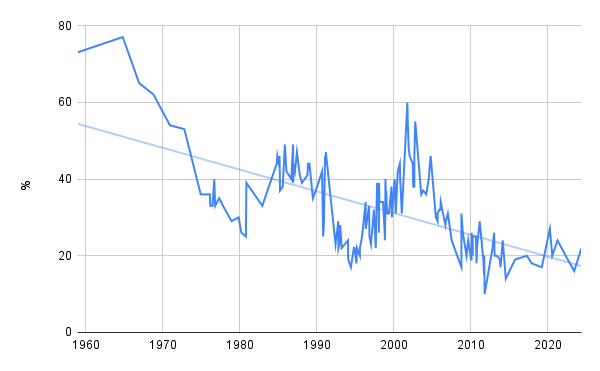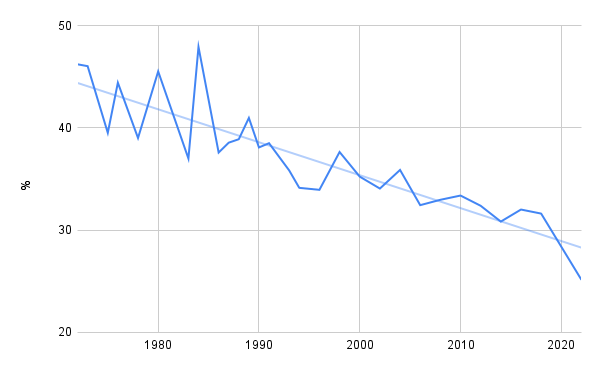The Trust Apocalypse
How We Lost Faith in Our Institutions and Each Other
Over the past several decades, trust—once the unseen glue holding our society together—has steadily eroded. Trust in institutions—government, media organizations, the scientific establishment, the judiciary, academia, health, and organized religion, to name a few—trust in Corporate America, and perhaps more worryingly, trust in each other, have all declined. Multi-decade polls, from Gallup and the Pew Research Center to Edelman’s annual trust surveys, confirm that this is a widespread and enduring trend, not a transient phase.
Gallup’s decades-long surveys reveal a steady erosion of trust in the fourteen key institutions (the church or organized religion, the military, the U.S. Supreme Court, banks, the public schools, newspapers, Congress, television news, organized labor, the presidency, the police, the medical system, the criminal justice system, and big business) it has tracked since 1993. Average confidence in these institutions remains historically low, at 28%.
Average Confidence in Major U.S. Institutions (Gallup)
Pew Research Center reports that as of April 2024, only 22% of Americans say they trust the government in Washington to do what is right just about always or most of the time. Last year, 16% said they likewise trusted the government, which was among the lowest measures in nearly seven decades of polling.
Most People Can Be Trusted (GSS)
Even the historically venerated Supreme Court has seen an erosion of trust over recent decades.
Great Deal/Quite a Lot of Confidence in the Supreme Court (Gallup)
The General Social Survey (GSS) conducted in the United States since 1972 by NORC at the University of Chicago includes a question about interpersonal trust: “Generally speaking, would you say that most people can be trusted or that you can’t be too careful in dealing with people?” In the early 1970s, a significantly higher portion of Americans said “most people can be trusted” than do today. Over the decades, the share answering “most people can be trusted” has decreased to under 30%.
Most People Can Be Trusted (GSS)
This decline in trust is not a mere statistical curiosity; it has profound real-world implications.
Collective Action and Social Cohesion
When trust erodes, coordinated action—whether in response to crises or to pursue shared goals—becomes increasingly complex. A society lacking trust is prone to gridlock, where cooperation gives way to suspicion and fragmentation. When we no longer have a basis for debate, strength becomes the determining factor.
Institutional Functioning
Institutions are designed to mediate conflict, provide services, and uphold the common good. Without trust, these institutions lose their legitimacy, resulting in inefficiency and a diminished ability to address the complex challenges of modern society. The scale at which societies can effectively organize shrinks, as evidenced by the reduction in power of supranational bodies (e.g., UN, WHO, EU) and a resurgence of nationalism.
Polarization and Fragmentation
As trust dwindles, society risks sliding into one of two dangerous trajectories: a low-trust society characterized by pervasive disengagement and social disarray or one marked by extreme polarization that could eventually lead to societal partition or collapse. Historical precedents, such as the breakup of Yugoslavia or the partition of India, remind us of the catastrophic consequences of unchecked societal fragmentation.
Recent news events serve as stark reminders of the high stakes involved.
The events of January 6th, where long-simmering distrust and polarization culminated in a direct attack on democratic institutions.
Incidents such as the attempted assassination of political figures and the high-profile targeting of leaders in major corporations underscore the volatility that accompanies the transition from a high to a low-trust society.
The aggressive rhetoric and policy decisions observed during recent administrations have further accelerated the erosion of trust as longstanding institutions are called into question or directly undermined.
The convergence of findings from Gallup, Pew Research Center, GSS, and Edelman paints a sobering picture. This phenomenon transcends isolated failures, reflecting a pervasive crisis destabilizing nearly every major societal structure. The implications are profound, as trust is the foundation of collective action, social cohesion, and the effective functioning of a complex society.



